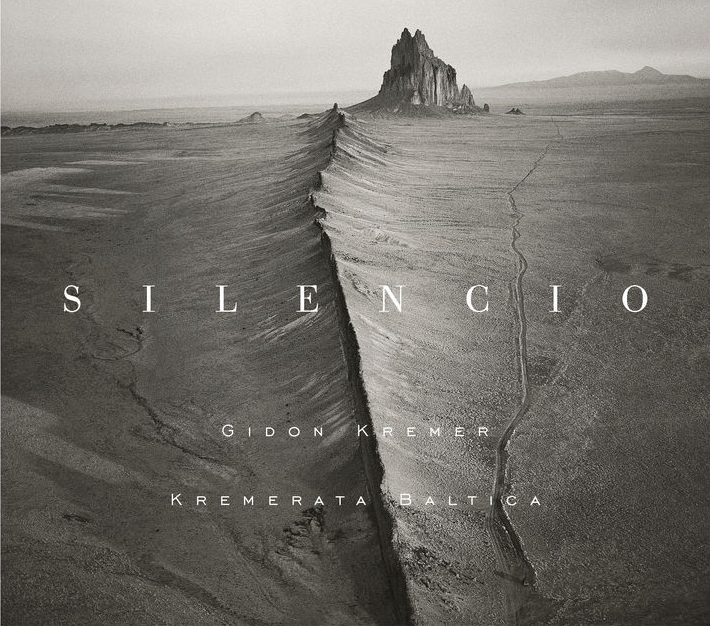
Gidon Kremer
Kremerata Baltica
Catalog
Tracks
1. I. Ludus – Con moto 10:21
2. II. Silentium – Senza moto 18:24
PHILIP GLASS: COMPANY FOR STRING ORCHESTRA
3. Movement I 2:34
4. Movement II 1:40
5. Movement III 1:51
6. Movement IV 1:56
VLADIMIR MARTYNOV: “COME IN!”
7. Movement I 3:32
8. Movement II 4:20
9. Movement III 5:03
10. Movement IV 5:04
11. Movement V 5:59
12. Movement VI 2:53
ARVO PÄRT: DARF ICH…
13. Darf Ich… 4:15
Notes
…Words irritate. Gestures mislead. Emotions dissolve. Only sounds speak a lan- guage that might be understood. If one opens the heart, would there be someone receptive enough? But who is listening? Who is able to feel it? Often I do ask my- self, where does a heartbeat identical to mine exist? And the attempt of an answer is: out there, on the other end of my own sound.
— Gidon Kremer, from Obertöne
Music must be given the chance to express itself. Words confine music. And then, music makes itself dependent on words. In my view, the very existence of music is jeopardized by today’s society’s obsession with communication.
— Arvo Pärt
In early 1983 a new Beckett work was produced by Mabou Mines at the Public Theater — an adaptation for the stage by Frederick Neuman of “Company,” a short novel by Beckett. It was presented as a monologue in four parts, directed and performed by Neuman. The music was placed in the monologue according to Beckett’s directions. (“I see. The music appears in the interstices of the text, as it were.”)
— Philip Glass
The odd sound. What a mercy to have that to turn to. Now and then. In dark and silence to close as if to light the eyes and hear a sound. Some object moving from its place to its last place. Some soft thing sofdy stirring soon to stir no more. To darkness visible to close the eyes and hear if only that. Some soft thing softly stirring soon to stir no more.
— Samuel Beckett, from Company
One ancient hermit said to his disciple: “Strive to enter the inner cell of your soul and there you will behold the heavenly cell. Both are one: you enter them by the same door. The staircase to Heaven is inside you: it exists secretly in your heart.”
And it is true:
Our whole life is but an attempt to find this miraculous entrance.
All our deeds are but a timid knocking on this mysterious door.
All our hopes are to hear, one day, perhaps, a voice that would respond:
“Come in!”For it is said: “Knock and you will be let in.”
— Vladimir Martynov
There is no such thing as an empty space or an empty time. There is always something to see, something to hear. In fact, try as we may to make a silence, we cannot.
— John Cage, from Silence
Credits
Recording produced by Helmut Mühle.
Edited by Gudrun Maurer.
Recorded November 25-27, 1998 at the Historical Museum, Tallinn.
Engineer: Erik Sikkema.
Darf ich… recorded September 10, 1999 at the Jesus-Christus-Kirche, Berlin.
Engineer: Philipp Nedel.
Design by John Gall.
Photographs by William Clift © 2000.
Gidon Kremer and the Kremerata Baltica would like to thank all of the composers who granted us this experience.
Tabula Rasa was written for, dedicated to and premiered by Gidon Kremer, Tatjana Crindenko and Eri Klas; premiered September 1977 in Tallinn.
“Come In!” was written for, dedicated to and premiered by Gidon Kremer and Tatjana Grindenko; premiered May 30, 1988 at the Grand Hall of D. Shostakovich Philharmonic Sociiu Leningrad, for the 3rd International Contemporary Music Festival.
Photograph of hands by Joachim Riihl, courtesy of Gidon Kremer’s personal archives.
Excerpt from page 282 of Obertöne by Gidon Kremer © 1997 Residenz Verlag, Salzburg und Wien. Used by permission of the author.
Excerpt from page 19 of Company by Samuel Beckett © 1980 by Samuel Beckett. Used by permission of Grove/Atlantic, Inc.
Excerpt from page 8 of Silence © 1973 by John Cage, Wesleyan University Press. Used by permission of University Press of New England.
Kremerata Baltica General Management: Itacamusica, Italy
Gidon Kremer/Kremerata Baltica website: www.gidon-kremer.com
Nonesuch: www.nonesuch.com
